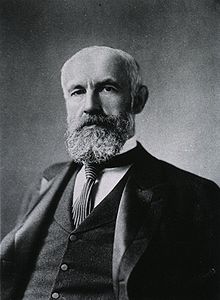G. Stanley Hall
| G. Stanley Hall | |
|---|---|

Granville Stanley Hall by Frederick Gutekunst, circa 1910.
|
|
| Born | February 1, 1846 Ashfield, Massachusetts |
| Died | April 24, 1924 (aged 78) Worcester, Massachusetts |
| Nationality | American |
| Fields | Psychologist |
| Doctoral advisor | William James |
Granville Stanley Hall (February 1, 1846 – April 24, 1924) was a pioneering American psychologist and educator. His interests focused on childhood development and evolutionary theory. Hall was the first president of the American Psychological Association and the first president of Clark University. A Review of General Psychology survey, published in 2002, ranked Hall as the 72nd most cited psychologist of the 20th century, in a tie with Lewis Terman.
Born in Ashfield, Massachusetts, Hall attended Williston Seminary and graduated from Williams College in 1867, then studied at the Union Theological Seminary. Inspired by Wilhelm Wundt's Principles of Physiological Psychology, Hall pursued doctoral studies at Harvard University where he met William James, an adjunct professor who had just taught the nation's first psychology class. In 1878, Hall earned the first psychology doctorate awarded in America. After Hall graduated with his doctorate, there were no academic jobs available in psychology, so he went to Europe to study at the University of Berlin, and spent a brief time in Wundt's Leipzig laboratory in 1879.
He began his career by teaching English and philosophy at Antioch College in Yellow Springs, Ohio, and then teaching history of philosophy at Williams College in Massachusetts. Following successful lecture series at Harvard and Johns Hopkins University, Hall secured a position in the philosophy department at Johns Hopkins, teaching psychology and pedagogy. He remained at Johns Hopkins from 1882 to 1888 and, in 1883, began what is considered by some to be the first formal American psychology laboratory. There, Hall objected vehemently to the emphasis on teaching traditional subjects, e.g., Latin, mathematics, science and history, in high school, arguing instead that high school should focus more on the education of adolescents than on preparing students for college.
...
Wikipedia
